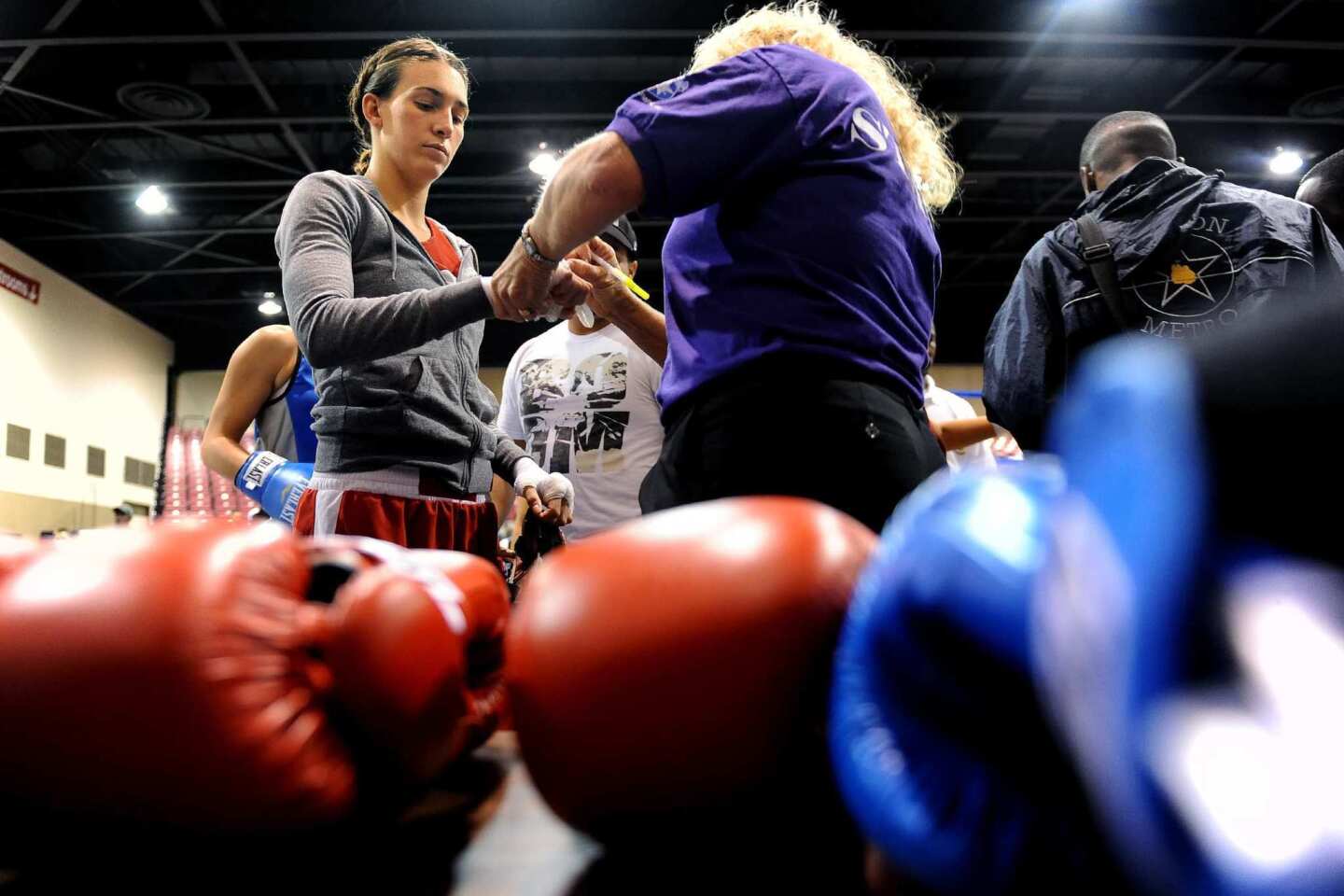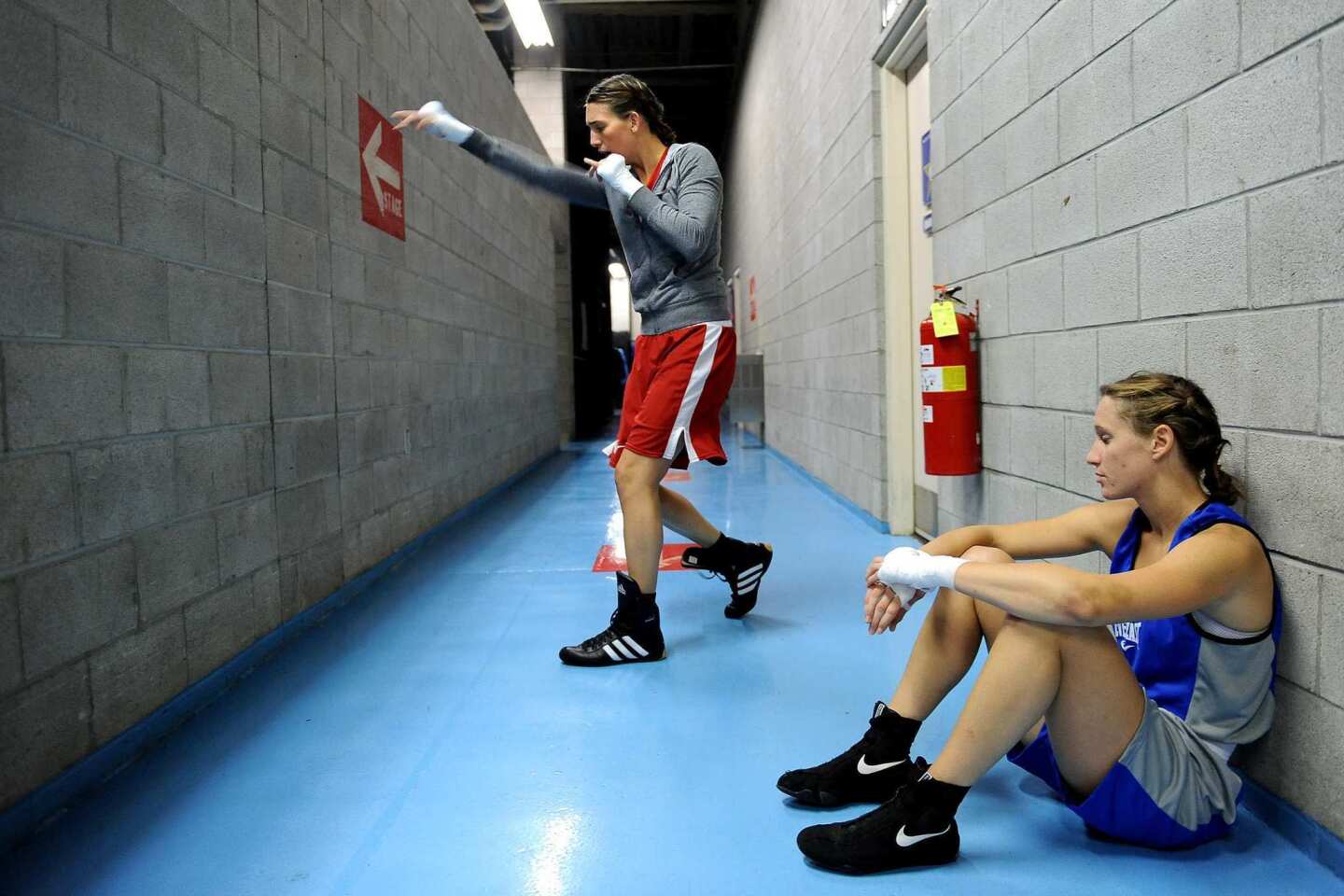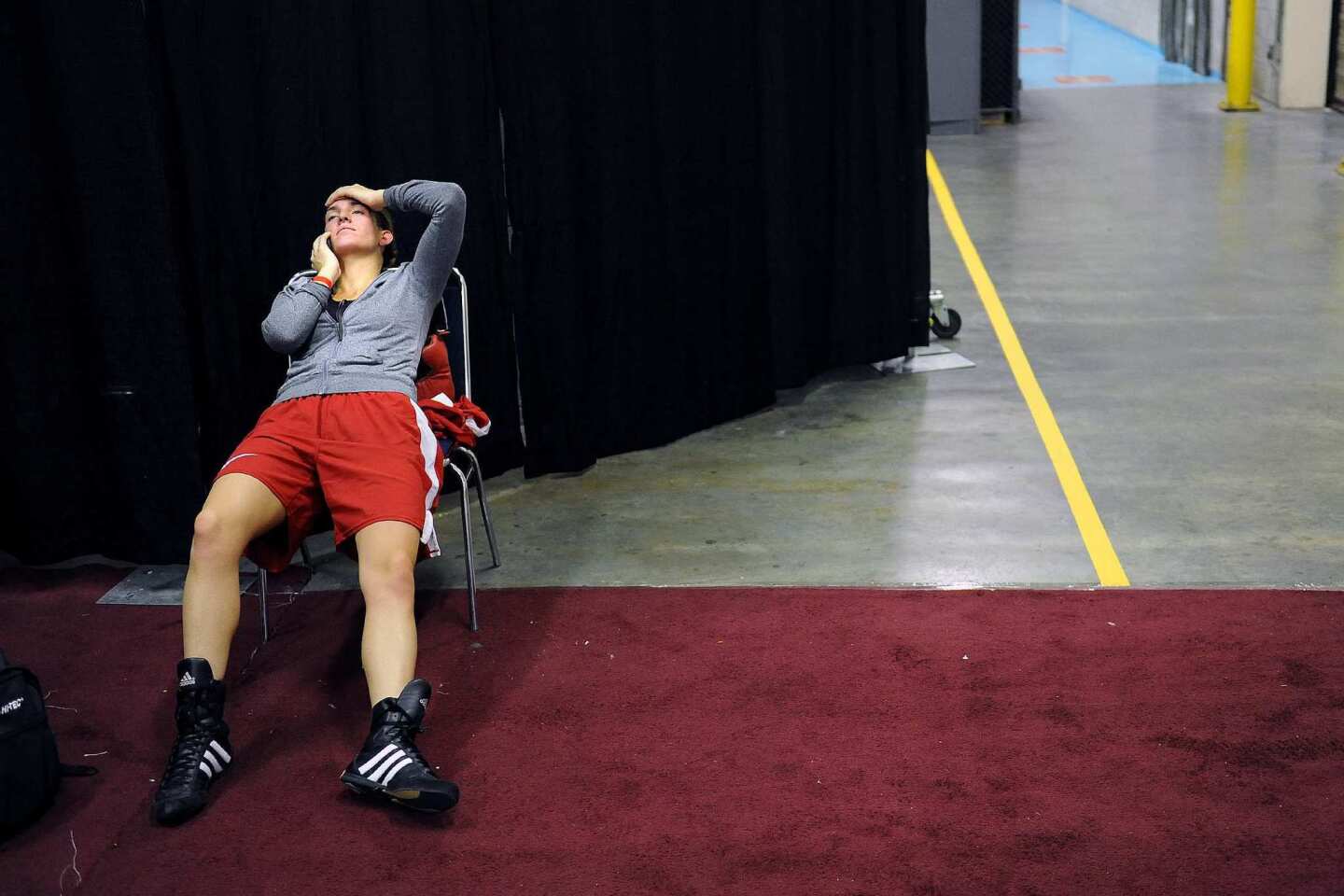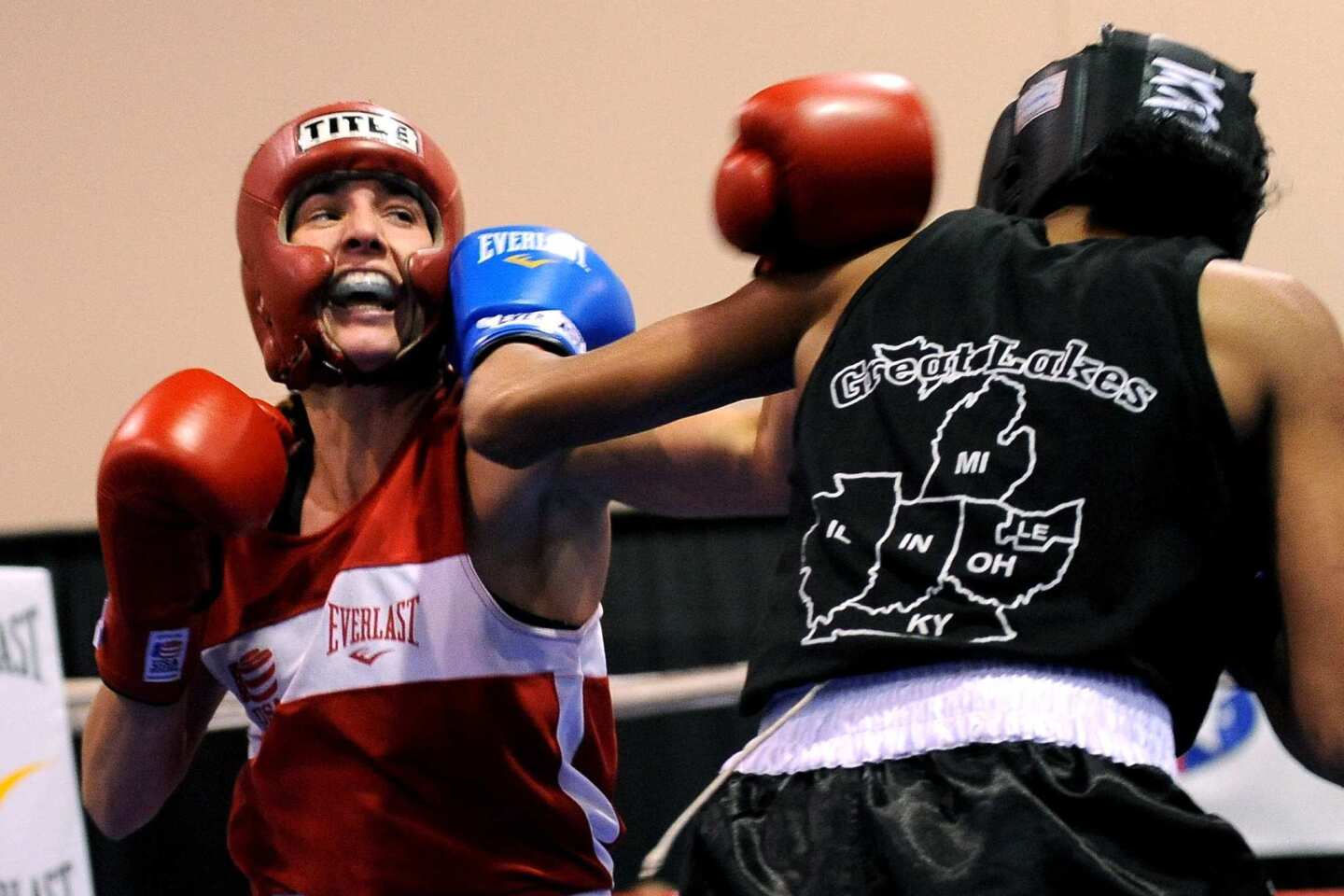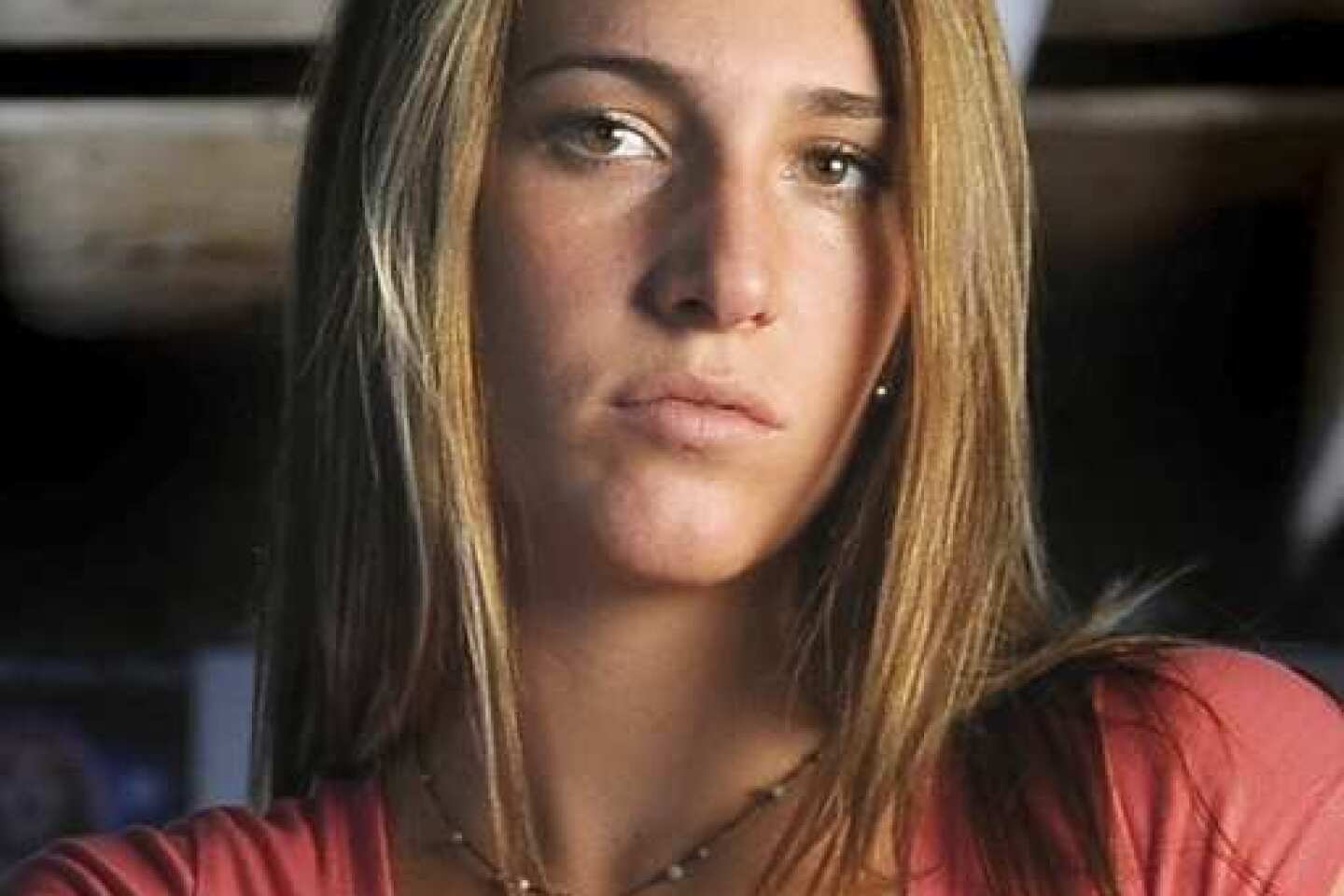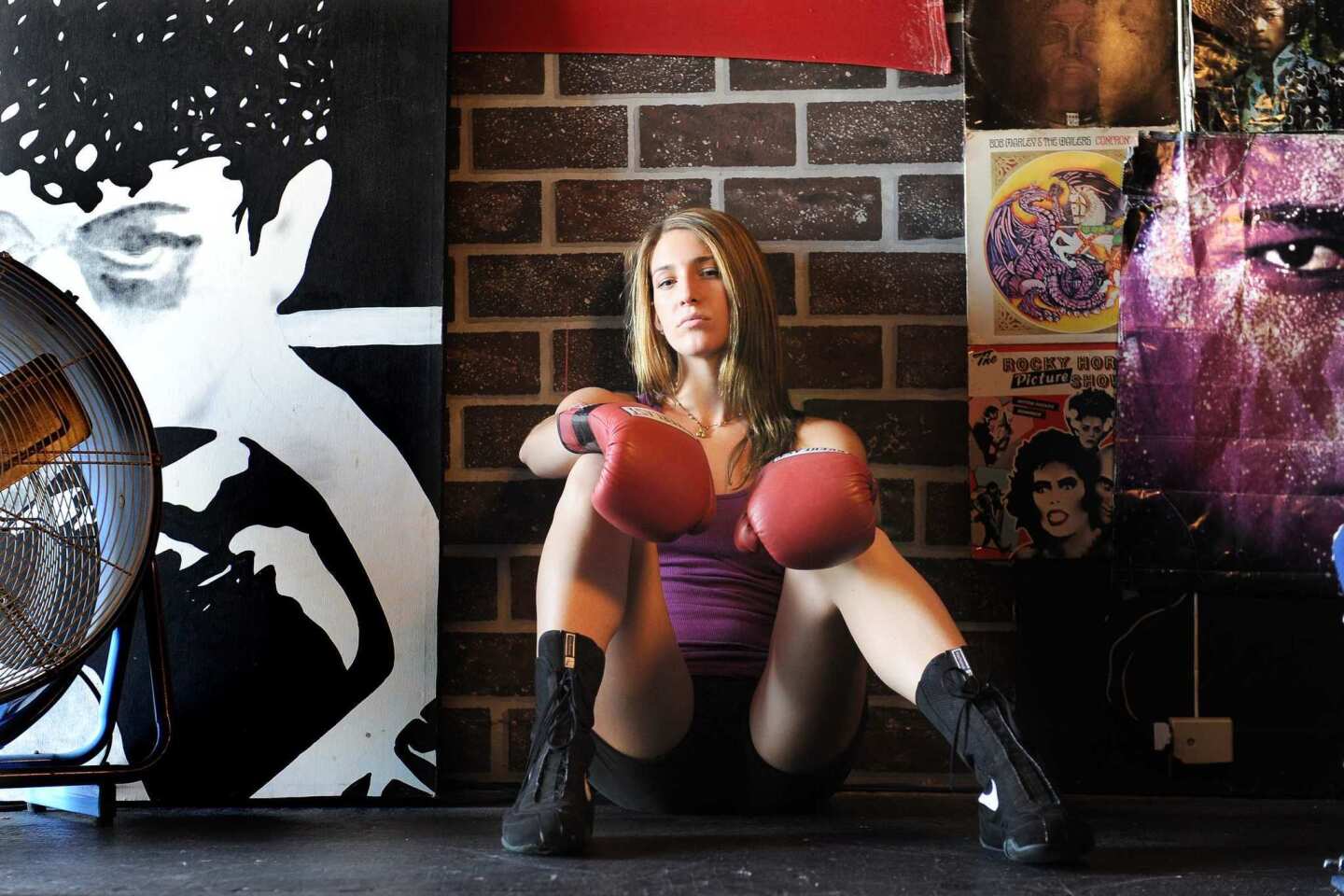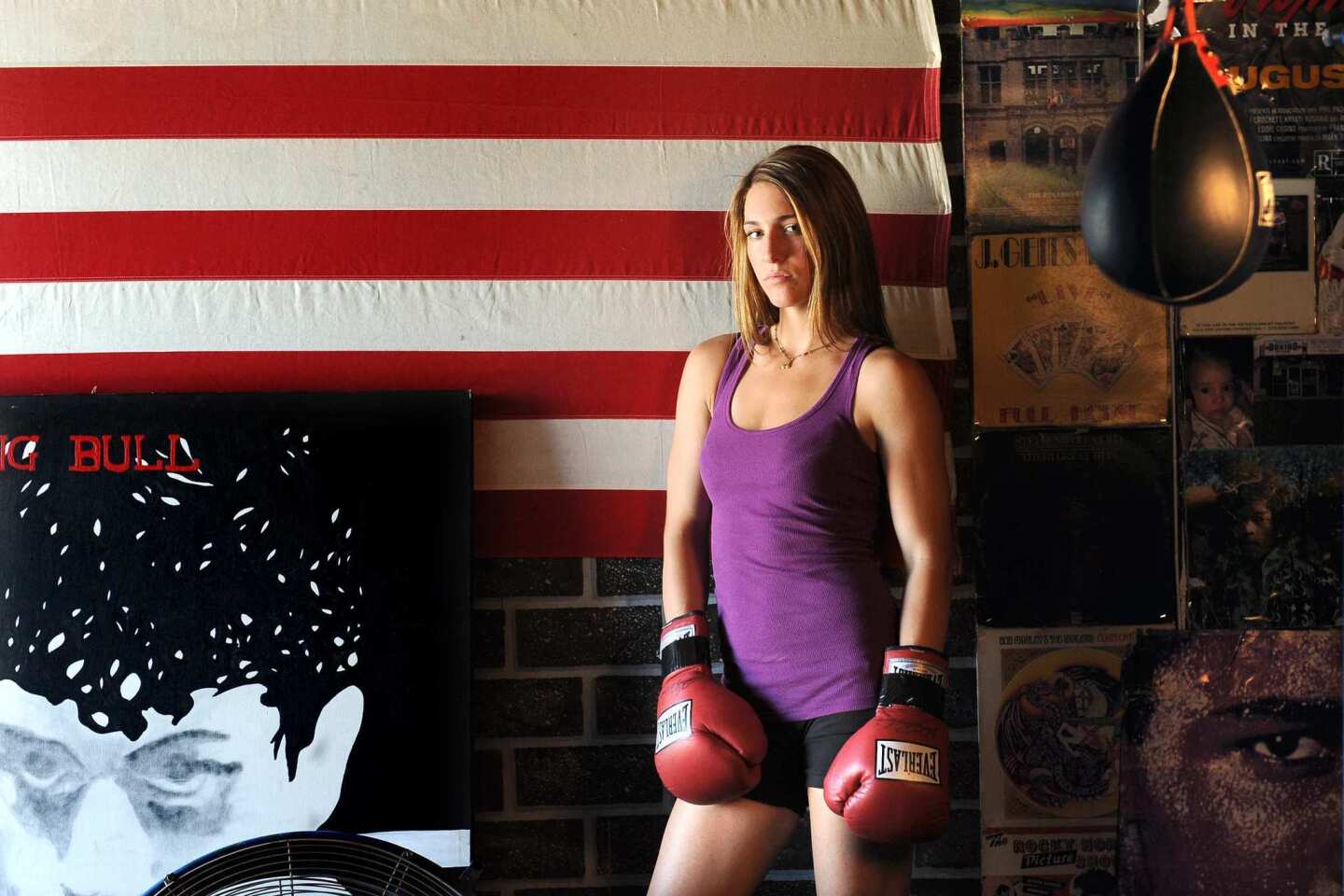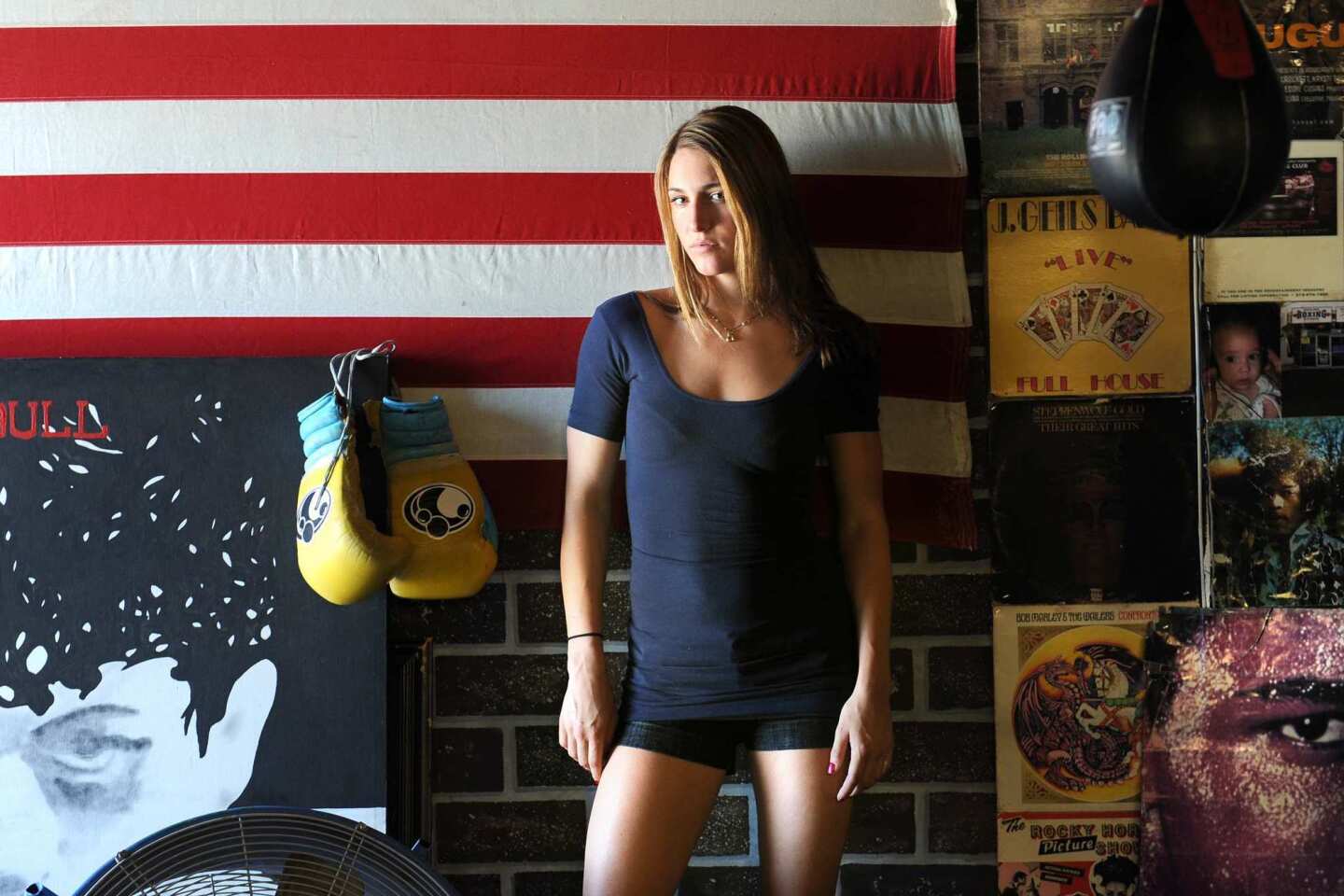2012 Olympics Road to London: Mikaela Mayer focuses on gold
- Share via
Seventh in a series of occasional stories.
Mark Mayer calls them “the hard times,” the weeks and months when his teenage daughter would simply disappear for days on end.
“I wouldn’t sleep at night,” he remembers. “I just didn’t think she was in the right place.”
Mayer has spent most of his adult life entertaining kids as a toy designer for Mattel. But raising them was an entirely different matter as he found out when his three daughters came to live with him in a two-bedroom apartment in Woodland Hills after his divorce.
The eldest, Lacey, and the youngest, Sadie, were joys. But the middle child? Well, she was a handful.
“I probably put him through hell,” Mikaela Mayer says. “This was my rebelling stage. We fought a lot.”
Six years later Mayer is still fighting, only now, at 21, she is among the favorites to earn a spot on the first U.S. Olympic boxing team for women. And her father, once her most intractable opponent, is in her corner.
“You forgive and forget,” Mark Mayer says. “I always just tried to be there and hoped that that would all go away. And in time it did.”
So much so that the puncher and the parent scheduled a holiday getaway to Big Bear for some skiing, some snowboarding and a lot of bonding.
“Honestly everything that I’ve done, every phase that I’ve gone through — whether good or bad — has brought me to where I am today,” Mikaela says. “The way he let me live my life and make my mistakes really helped me form who I am.”
Round 1
Mark Mayer, a stocky, barrel-chested man with a neat beard and a pair of hoop earrings in his left ear, grew up on the west end of the San Fernando Valley, where he excelled in most sports but dominated none.
And like most fathers, Mayer, 51, always felt his daughters were destined for big things. Yet even that faith couldn’t prepare him for how precocious Mikaela would prove to be.
In grade school she was already wrecking dirt bikes in the desert. Her dad took her surfing in the summer and snowboarding in the winter.
At 14, without having taken a formal music lesson, she was playing bass guitar on a national tour with Lia-Fail, an all-girl rock band.
“I thought this is cool. She’s going to be a famous musician,” Mark says. “But then she dropped it and never picked it up again.”
She did pick up a boyfriend, though, and that quickly drove a wedge between her and her father.
“Young people kind of get wrapped up in relationships and I really got wrapped up in my relationship,” she says. “To a point where I wouldn’t come home for weeks at a time. I was ditching school every day.”
Mark Mayer blames himself.
“I would tell her that I didn’t like her boyfriend,” he says. “I started to learn later on just don’t tell them that you don’t like their boyfriend. Some parents, I think they lose their relationships with their kids when they start telling them their boyfriend’s an idiot or stuff like that.”
Which isn’t to say Mark Mayer didn’t believe it. The boyfriend was part of an older crowd Mikaela had fallen in with, one that partied hard and studied … well, never. By the time she started her senior year of high school at a continuation school, Mikaela had been kicked out of one school and withdrew from another.
She even failed while being home-schooled.
But then she stumbled into Ric O’Kane’s muay thai gym, where she found the focus she had been missing and the future she thought she’d never have.
“I had a major epiphany,” she remembers. “I’ve always been good at everything I’ve attempted. If I was to put all my energy into one thing I could be great at it. And it was boxing.”
Round 2
Mikaela won her first 10 fights in muay thai — a combat sport that features stand-up striking, kicking and clinching — then, at O’Kane’s urging, switched to boxing and quickly won two national titles.
“She started boxing and literally we didn’t know anything about it,” Mark Mayer says. “The first two tournaments she went to, we won. We’d never ever been to a tournament.
“I thought she could never lose.”
Mark Mayer began spending thousands of dollars to follow Mikaela around the country for competitions, checking her into the right hotels and making sure she got up on time.
“That’s just the dad in him,” Mikaela says. “I knew what I was doing.”
But if Mark Mayer’s daughter was morphing into the son he never had, she wasn’t taking a direct route. At about the same time Mikaela started boxing she also began modeling, with her sharp features and statuesque 5-foot-9 frame she landed the cover of a minor magazine.
In some places, in fact, she’s better-known for her looks than her hooks. On a recent trip to China with her new coach, Al Mitchell, Mikaela was besieged by a group of Chinese girls.
Sadie, 16, who has also tried her gloves at boxing, smiles at her sister’s tough-girl image and whispers that modeling better suits Mikaela’s personality.
“Behind the scenes she’s really not a tomboy,” she says. “She’s girlie.”
But if there was doubt over which endeavor she’d pursue it was erased in 2009 when the International Olympic Committee announced women’s boxing would make its debut in the London Games. Modeling, it seemed, would have to wait.
“I call her the Dream Killer,” Mark Mayer says. “I’ve seen her fight so many girls and beat them up so bad … that you don’t see them again. There is something definitely special about it.
“I mean how often do you get to have the Olympic champion?”
Round 3
Last spring Mark Mayer moved from the Valley to a loft in the old Pabst Blue Ribbon brewery, now an artists’ colony squeezed between the 5 Freeway and Dodger Stadium.
“It’s really different,” Mikaela says, punctuating her comments with a staccato laugh. “But we’re like totally not an ordinary family so it fits us.”
Mikaela gets her mail at the loft and visits on special occasions. But she spent most of the last year in Marquette, Mich., where she moved a year ago to work with Mitchell.
“I went there thinking I was decent and he just broke me down,” Mikaela says. “Within six months he made me just 50 times better. I don’t think I would have a chance at this trials if it wasn’t for him.”
The Olympic trials will take place in mid February just outside Spokane, Wash, with women fighting at three weights — 112, 132 and 165 pounds. The 132-pound class, where Mikaela will fight, is crowded with most of the nation’s top amateur boxers — including Patricia Manuel of Long Beach, the first woman to beat Mikaela; Ohio’s N’yteeyah Sherman, who beat both Manuel and Mikaela to win the national Police Athletic League tournament in October; and Seattle’s Queen Underwood, a five-time national champion and the only U.S. woman to win a world championship medal at an Olympic weight.
“There’s lots of good girls coming to the trials,” Mikaela says. “This trials is up for grabs.”
Yet few boxers will come to Spokane riding more momentum than Mikaela, who beat former European Union champion Sandra Kruk and World Championship medalist Karolina Graczyk, both of Poland, and former world kick-boxing champion Julia Irmen of Germany on successive days in last month’s International Dual Series in Oxnard.
“Mikaela adjusted to three or four different styles beautifully,” Mark Mayer says. “All of a sudden we’re saying ‘Wow! You can do this.’”
But if the Oxnard tournament boosted Mikaela’s confidence it didn’t leave her complacent.
“I want more fights,” she says. “The more the better because you’re gaining experience. You learn so much for every fight.”
Round 4
Amateur bouts last four rounds of two minutes each. So by that count Mikaela Mayer is entering the final seconds of her long preparation for the Olympic trials — and, possibly, the eight minutes that will determine whether she’ll make history or have to wait four years for another shot.
After the family snowboarding trip, she’ll return to boxing, beginning a final six-week training cycle.
“It’s [been] nice having her around,” Mark Mayer says. “She’s all over the world. But it’s kind of fun to call her and see what she’s up to.”
It wasn’t so long old ago that Mikaela wouldn’t take those calls. Now, she says, she can’t wait for the phone to ring.
“We definitely have overcome a lot of obstacles,” Mikaela says. “We’re in a really good place right now. Our whole family.”
More to Read
Go beyond the scoreboard
Get the latest on L.A.'s teams in the daily Sports Report newsletter.
You may occasionally receive promotional content from the Los Angeles Times.
